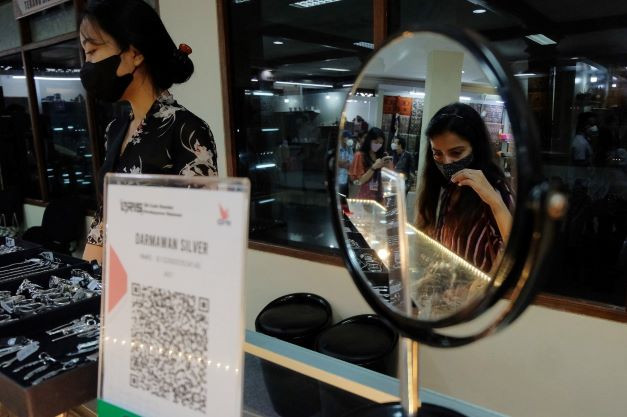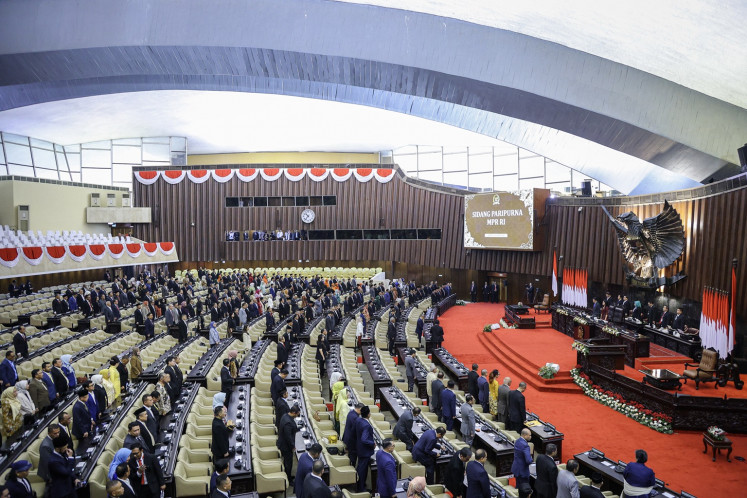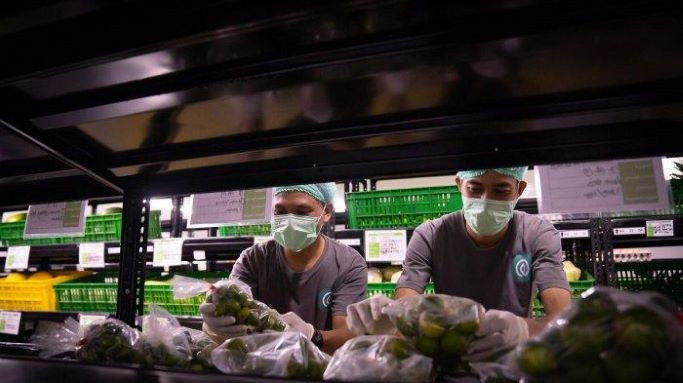Popular Reads
Top Results
Can't find what you're looking for?
View all search resultsPopular Reads
Top Results
Can't find what you're looking for?
View all search resultsA rural micro-enterprise road to embrace the digital economy
Despite the willingness to go digital, many enterprises lack the capacities and skills to effectively use digital platforms to transact online.
Change text size
Gift Premium Articles
to Anyone
I
ndonesia is on the path to establishing itself as a world leader in e-commerce. As the COVID-19 pandemic rages on, the country’s e-commerce market continues to boom as customers’ buying behaviors change and accelerate the shift to digital channels.
A survey done by DBS bank highlights that the number of e-commerce customers in Indonesia increased to 66 percent after the COVID-19 pandemic hit the country as a direct impact of the Large-scale Social Restrictions (PSBB).
Despite such high demand, for many micro and small businesses, particularly in rural areas and peri-urban areas, going digital has been a daunting task. For most micro and small businesses, going digital is not a choice but an imperative to sustain business in the post-COVID-19 world, more so for rural enterprises that may not have direct access to markets.
However, as per the data of the Cooperatives and Small and Medium Enterprises Ministry, only 19 percent (12 million) of Indonesian micro-enterprises are part of the digital ecosystem. The latest Statistics Indonesia (BPS) data on e-commerce businesses in Indonesia show that only 8 percent of the businesses have ever received any form of formal training on using digital tools for business.
While the government and stakeholders are committed to supporting more micro, small and medium enterprises (MSMEs) in the digital ecosystems, challenges and obstacles abound. Reports indicate that access to 4G networks evades more than 12,000 villages in Indonesia. While 90 percent of 4G signals are available in urban areas, the number drops to just 76 percent in rural areas.
Even in Java -- the most developed and populous island in the archipelago -- the internet penetration is only 56.4 percen,t and the percentage is much lower in less populous islands such as Sulawesi and Papua, at below 10 percent.
As network connectivity continues to be a major concern in remote areas, some frugal innovations have enabled network access even in remote areas. A study conducted by MicroSave Consulting (MSC) found that enterprises in remote areas are selling wi-fi vouchers worth Rp 2,000-5,000 (US$0.13-$0.34) for a few hours of access. While these may not be perfect solutions and there are disruptions in the quality of access, nevertheless, they do provide a workaround until the public infrastructure reaches these locations.
With banking and logistics services going deeper into the rural heartlands, micro-enterprises are also eager to use digital platforms to buy and sell online. However, despite the willingness to go digital, many enterprises lack the capacities and skills to effectively use digital platforms to transact online.
These enterprises usually struggle with aspects related to registration to digital commerce platforms, digital marketing and digital payments. The BPS data show that out of 2.3 million businesses that sell online, only 21 percent are selling on platforms/marketplaces while most e-commerce selling happens through instant messaging applications (94 percent). Also, for 79 percent of the e-commerce businesses, the most preferred payment method is cash-on-delivery.
To make the digital experience less daunting for rural enterprises, policymakers have attached a lot of importance to capacity-building programs. So far, the results of capacity-building efforts have been mixed. While such efforts have been able to raise the awareness of rural enterprises, they have often struggled to apply the knowledge in their businesses.
In many cases, such capacity-building efforts become a one-off activity with little impact in inducing sustained behavior change.
Our engagement in a financial diaries project with rural corner shops has highlighted some key lessons that could be applied to make digital capacity-building efforts more fruitful. In our study, we tracked daily financial data of a sample of rural corner shops over a year, in which the quantitative data were complemented with qualitative interviews.
The experiences of our diarists highlight critical points to consider while designing programs and policies to build the digital capacities of rural micro-enterprises. From this study, we can draw up the following policy lessons.
First, we must communicate the value proposition to ensure the growth of digital adoption. Many initiatives to grow the digital economy focus only on the process of signing up and using digital tools or platforms. They fail to communicate the value proposition of embracing the digital ecosystem effectively.
Moreover, value propositions may differ based on the profile of micro-entrepreneurs. Generic communication fails to convince potential users in such a case. The initiatives should segment micro-entrepreneurs based on their personas and customize the messaging around the value proposition. This move will enable concerned entrepreneurs to relate to the proposed benefits of joining the digital bandwagon.
Second, rural entrepreneurs build trust through peer learning. Rural micro-enterprises relate better to information from someone they know and trust. Hence, programs that involve community members in capacity-building efforts are more likely to succeed. Rural community-based institutions, such as cooperatives, are crucial to ensuring digital tools and platforms reach the last mile.
Third, local success stories make the learning process more tangible and relatable. Rural micro-entrepreneurs gain confidence from success stories in their community. Capacity-building programs must include such case studies or personal interactions.
Fourth, even if micro-entrepreneurs learn about the processes related to an individual platform or tool, knowledge of interconnections between different platforms and support services is essential to understand the ecosystem better. The learning curriculum should include a detailed guide of products and services offered by support service providers in their area.
Finally, micro-entrepreneurs should be equipped to resolve grievances and safeguard themselves against cybercrimes. Micro-entrepreneurs face several risks as they enter the digital ecosystem. They might lack digital knowledge and experience, and an encounter with online fraud may affect their trust in the system. Therefore, MSMEs need adequate knowledge and capacity in preventive and curative measures to avoid and resolve any potential grievances.
The operations of micro-enterprises witnessed a paradigm shift in the post-pandemic era. Embracing digital ecosystems became the new normal. The rapid growth in digital platforms is disrupting corner shops, which form the backbone of Indonesia’s rural economy.
Indonesia needs robust policies and programs to facilitate the digital transformation of rural corner shops.
***
Rahmatika Febrianti and Yani Parasti Siregar are assistant managers at MicroSave Consulting (MSC). Alfa Gratia Pelupessy, Raunak Kapoor, and Siti Muthmainnah contributed to this article.










